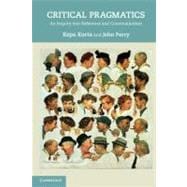
Note: Supplemental materials are not guaranteed with Rental or Used book purchases.
Purchase Benefits
Looking to rent a book? Rent Critical Pragmatics: An Inquiry into Reference and Communication [ISBN: 9780521748674] for the semester, quarter, and short term or search our site for other textbooks by Kepa Korta , John Perry. Renting a textbook can save you up to 90% from the cost of buying.
| Preface | p. xi |
| Acknowledgments | p. xiii |
| Introduction | p. 1 |
| A conversation at Hondarribia airport | p. 1 |
| Three ideas | p. 3 |
| The anatomy of an utterance | p. 8 |
| Singular reference | p. 12 |
| The plan | p. 14 |
| A short history of reference | p. 15 |
| Introduction | p. 15 |
| One hundred-plus years of reference | p. 15 |
| The problem of cognitive significance | p. 21 |
| From Kaplan to utterances | p. 22 |
| Acts, roles, and singular reference | p. 25 |
| Introduction | p. 25 |
| Acts and actions | p. 25 |
| Roles | p. 28 |
| Signs and information | p. 30 |
| Gricean reference | p. 31 |
| Elements of reference | p. 37 |
| Introduction | p. 37 |
| Cognition and information: an analogy | p. 37 |
| A modest theory of ideas | p. 38 |
| Paradigm referential plans | p. 40 |
| Examples | p. 43 |
| Demonstratives | p. 46 |
| Introduction | p. 46 |
| The professor and the portrait | p. 47 |
| Forensics | p. 48 |
| Walking through Donostia | p. 51 |
| Truth-conditions | p. 53 |
| Demonstratives and the problems of cognitive significance | p. 55 |
| Context sensitivity and indexicals | p. 59 |
| Role-contexts | p. 59 |
| Indexicals | p. 60 |
| Using 'I' | p. 63 |
| Indexicals, dates, and time | p. 69 |
| Technology and indexicals | p. 71 |
| Names | p. 74 |
| Introduction | p. 74 |
| Names and nambiguity | p. 74 |
| Networks and reference | p. 76 |
| Names and roles | p. 82 |
| Names as role-coordination devices: examples | p. 83 |
| Names and cognitive significance | p. 85 |
| The no-reference problem | p. 88 |
| Definite descriptions | p. 90 |
| Introduction | p. 90 |
| Incomplete descriptions | p. 92 |
| Designational truth-conditions and referring* | p. 94 |
| Inaccurate descriptions | p. 96 |
| Conclusion | p. 100 |
| Implicit reference and unarticuiated constituents | p. 102 |
| Introduction | p. 102 |
| Unarticuiated constituents and the supplemental nature of language | p. 102 |
| Three kinds of unarticuiated constituents | p. 104 |
| Whence unarticuiated constituents? | p. 109 |
| Are unarticuiated constituents a myth? | p. 111 |
| Locutionary content and speech acts | p. 114 |
| Introduction | p. 114 |
| Locutionary content versus what is said | p. 114 |
| Locutionary acts and locutionary content | p. 116 |
| Locuted but not said: some examples | p. 118 |
| Locutionary versus propositional content | p. 120 |
| Conclusion | p. 124 |
| Reference and implicature | p. 125 |
| Introduction | p. 125 |
| Grice and what is said | p. 126 |
| Eros'thirst | p. 128 |
| Identity, implicature, and cognitive significance | p. 130 |
| The man who has run out of petrol | p. 132 |
| The maxim of manner of reference | p. 134 |
| Conclusion | p. 138 |
| Semantics, pragmatics, and Critical Pragmatics | p. 139 |
| Introduction | p. 139 |
| Situating semantics | p. 140 |
| Semantic content, raw and refined | p. 142 |
| Minimalism, contextualism, and Critical Pragmatics | p. 143 |
| Grice's circle | p. 147 |
| Harnessing information | p. 150 |
| Introduction | p. 150 |
| Content | p. 150 |
| Propositions and the structure of action | p. 158 |
| Coding and classification | p. 160 |
| Back to Hondarribia | p. 163 |
| Examples | p. 166 |
| Bibliography | p. 170 |
| Index | p. 175 |
| Table of Contents provided by Ingram. All Rights Reserved. |
The New copy of this book will include any supplemental materials advertised. Please check the title of the book to determine if it should include any access cards, study guides, lab manuals, CDs, etc.
The Used, Rental and eBook copies of this book are not guaranteed to include any supplemental materials. Typically, only the book itself is included. This is true even if the title states it includes any access cards, study guides, lab manuals, CDs, etc.